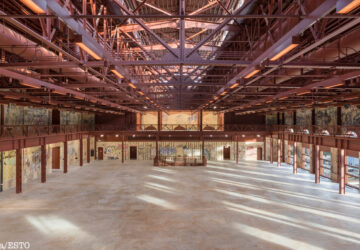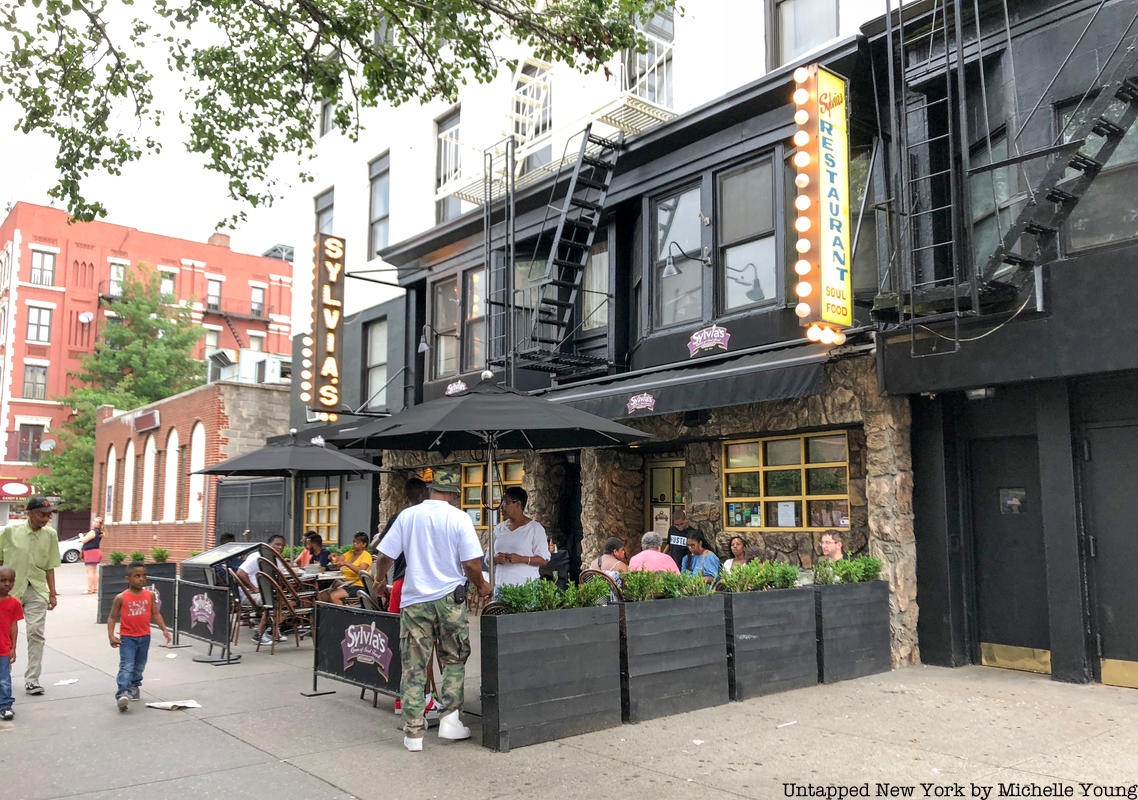 Inside Lit Bar
Inside Lit Bar
As demonstrations in honor of George Floyd and other African-Americans who have lost their lives to police violence continue through this week, many people across the country are looking for ways to support local Black-owned businesses. Across the country, people have been purchasing books from Black-owned bookstores, shopping online at Black-owned clothing stores, and ordering food from Black-owned restaurants.
Black-Owned Brooklyn, a curated guide to Black Brooklyn’s people, places and products, have been documenting and highlighting Black-owned businesses across the borough, and food critic for The New Yorker Hannah Goldfield and social media manager of Bon Appetit Rachel Karten have compiled spreadsheets of currently open Black-owned restaurants in New York. Untapped New York has compiled our own guide to Black-owned restaurants across the five boroughs, from the Senegalese eateries of West Harlem to the Guyanese restaurants of Jamaica to the Togolese and Guinean spots of West Bronx.
Manhattan
Harlem
Harlem, the epicenter of Black culture in Manhattan, is home to at least 50 Black-owned eateries, representing everything from soul food to Senegalese to Nigerian. Harlem developed as a Jewish and Italian area in the 1800s, but after the Great Migration of the early 20th century, many African Americans from the south settled around Harlem to seek better jobs and education. Harlem soon after experienced its namesake cultural Renaissance, which saw figures like Langston Hughes, Alain Locke, and Duke Ellington rise to fame. However, Harlem was hit hard in the Great Depression, and soon after Harlem was the scene of rent strikes to improve housing. Despite efforts like the Model Cities Program, Harlem struggled throughout the 20th century to improve education for students, and many Harlem residents who found fruitful employment left the neighborhood.
Despite this, Harlem houses some of the best Black-owned restaurants in all of the city. Perhaps the most famous is Sylvia’s, a soul food restaurant founded in 1962 by Sylvia Woods whose diners have included Nelson Mandela, Bill Clinton, and Barack Obama. Soul food like fried chicken, ribs, and shrimp and grits feature on the menu of Amy Ruth’s, another well known spot opened in 1999 named for founder Carl S. Redding’s talented grandmother. Other soul food eateries in Harlem include Melba’s, BLVD Bistro, Miss Mamie’s Spoonbread Too, and Charles’ Country Pan Fried Chicken in Harlem whose founder Charles Gabriel has been the recipient of numerous James Beard Award nominations. Readers also recommend Londell’s, Tsion, Reverence, Jacob, Ruby’s, Chocolate, Les Ambassades, Lee Lee’s, Lolo’s, and 67 Orange. In addition, there is Harlem Hops, Manhattan’s only Black-owned craft beer bar.
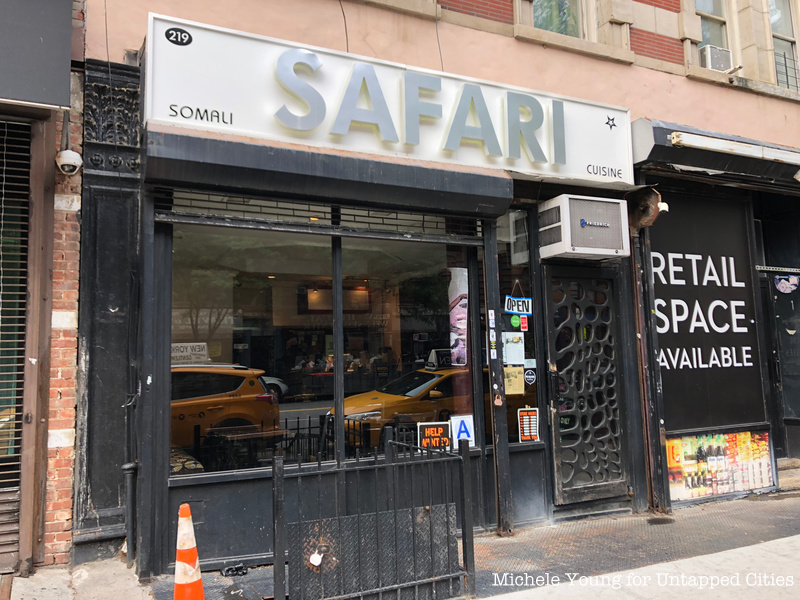
West Harlem is home to a small ethnic enclave called Little Senegal, known for its West African restaurants and shops. Pikine, a Senegalese restaurant, serves dishes like Thiéboudienne, Senegal’s national dish consisting of grilled fish, broken rice, tomato sauce, and cabbage. A bit more uptown is Africa Kine, known for Senegalese dishes like chicken yassa, and nearby Chez Alain serves West African fare like peanut butter stew and fish and jollof rice. Also in the area is Safari Restaurant, one of the city’s only Somalian restaurants.
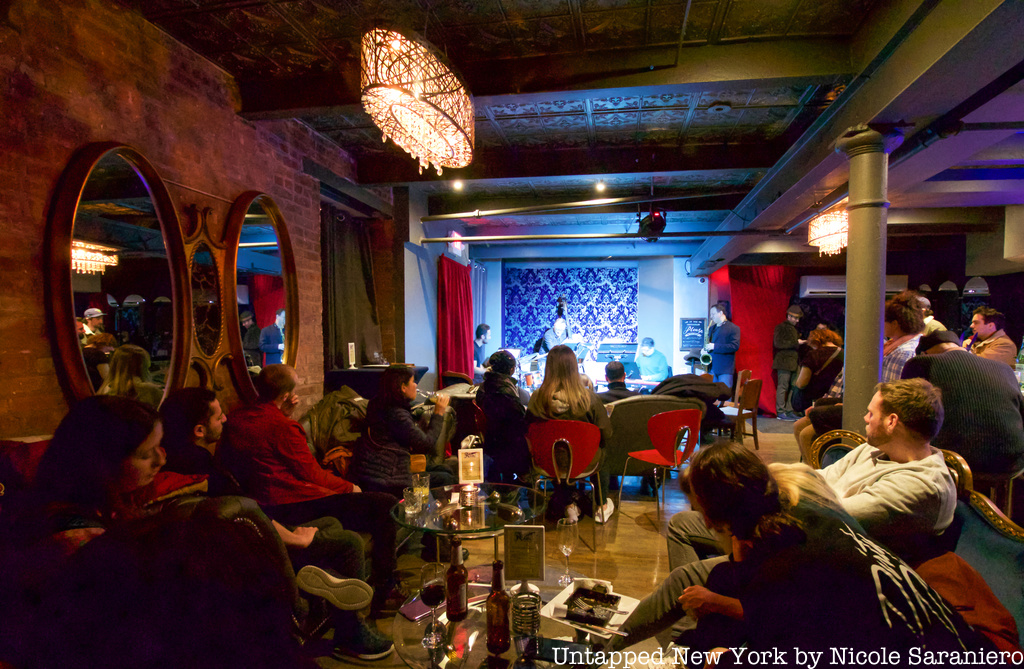 Room 623 Speakeasy sits below B2 Harlem, a Black-owned Caribbean restaurant
Room 623 Speakeasy sits below B2 Harlem, a Black-owned Caribbean restaurant
Harlem also prides itself on its modern approaches to cooking that fuse older recipes with culinary trends. Lee Lee’s Baked Goods is best known for its rugellach, a Jewish dish originating in Poland, and Ponty Bistro offers a mix of French, American, and West African fare. Teranga offers a play on fast food with its make-your-own West African grain bowls, and Uptown Veg and Juice Bar serves vegan options like curried chickpeas and collard greens. Contemporary approaches to seafood and Caribbean cooking can be found at restaurants like B2 Harlem and LoLo’s Seafood Shack.
Lower Manhattan
Outside of Harlem, Manhattan is not particularly known for its Black-owned restaurants, but there are at least a dozen in Lower Manhattan serving up a diverse selection of cuisines like Nigerian, Berber, and Southern fare. After emancipation, African Americans settled in communities like Seneca Village in modern-day Central Park and Sandy Ground on Staten Island, but the Great Migration led to exponentially increasing Black populations in Hell’s Kitchen (which today houses a Haitian and an Ethiopian restaurant) and Greenwich Village. As Lower Manhattan became more expensive, many black residents either moved uptown to Harlem or towards the surrounding boroughs like Brooklyn in Bedford-Stuyvesant or Crown Heights. Lower Manhattan also saw a recent increase in Caribbean immigration to areas like the Lower East Side.
The Lower East Side houses a handful of Black-owned restaurants like Omar’s Kitchen & Rum Bar, a “nouveau Caribbean” eatery with dishes like breadfruit tacos and curry oxtail. Whipped – Urban Dessert Lab prides itself on its oat-milk soft serve with bases like chocolate and sweet creme. Also notable is Cheeky Sandwiches, which serves po’ boys and other New Orleans-inspired sandwiches, and Las Lap bar.
In West Village, Berber Street Food serves a variety of cuisines, from Kenyan to Tanzanian to Mozambican. Popular dishes range from Zanzibar vegetable curry to Djolof Fried Rice to Calypso grilled jerk wings with habanero mango salsa. Also in West Village is Urban Vegan Kitchen, known for veggie burgers, nachos, and sandwiches. Nearby Greenwich Village is home to Negril Village, serving “New York Savvy Caribbean cuisine” like Guava BBQ wings and collard green spring rolls.
There are also a number of Black-owned eateries in the East Village, like ice cream store Mikey Likes It, Southern comfort-food restaurant Sweet Chick, and Ethiopian eatery Haile. And in Hell’s Kitchen, Casa Del Toro, a Oaxacan eatery, serves up regional dishes like shrimp and steak tacos and tlayudas, as well as signature cocktails and wine. The eatery is owned by Sanjay Laforest, who also owns the nearby French bistro Le Privé
The Bronx
 Inside Lit Bar, started by Noëlle Santos who identifies as an Afro-Latina
Inside Lit Bar, started by Noëlle Santos who identifies as an Afro-Latina
With 43.6% of its population identifying as Black or African American, the Bronx has one of the highest Black populations in the country, as well as at least a few dozen Black-owned restaurants. Mostly a rural area until the late 1800s, the Bronx experienced a boom in the early 20th century, hosting the 1918 World’s Fair and becoming one of the world’s manufacturing centers of pianos. However, during Prohibition, the area became known for its gangs and bootleggers, and throughout the Great Depression and World War II, the area experienced “white flight,” leaving the area mainly populated by rather poor African Americans and Puerto Ricans. After the construction of Co-op City, the area saw a rise in minority middle-income families, yet the construction of the Cross Bronx Expressway and high-rise housing projects has led the Bronx towards a decline. However, the Bronx’s “Ten-Year Housing Plan” and growth in retail stores, hotels, and medical research has revitalized much of the Bronx.
South Bronx
The South Bronx is home to a number of Black-owned restaurants serving Southern, Caribbean, and West African cuisines. Paying homage to the birth of Hip-Hop, Beatstro offers a blend of Puerto Rican and Southern Comfort food with dishes like pernil with salsa verde and St. Louis pork ribs. Also serving soul food is Sam’s Soul Food Bar and Lounge and Flava’s International Grill, which also offers Jamaican dishes. Restaurants like Balimaya and Papaye serve West African food, Malian and Ghanaian respectively. Other Black-owned eateries in the South Bronx include Bricks & Hops Beer Garden and Margarita’s. In Mott Haven, Lit Bar, which was the Bronx’s only bookstore when it opened in 2019, is still fulfilling book orders.
West Bronx
Although not as many as South and East Bronx, West Bronx contains a handful of Black-owned eateries like Corner Style Jamaican in Concourse. In Fordham is Bate Nabaya Restaurant, named for a region in Guinea, which serves dishes like Garba fish and okra stew. Other eateries include Osei Krom African Restaurant and Accra Restaurant, both serving Ghanaian food, and Bognan, the city’s only Togolese restaurant.
East Bronx
There are at least a dozen Black-owned restaurants in East Bronx, specifically around the areas of Parkchester and Soundview. In Castle Hill are Juices for Life, which serves healthy drinks and Jamaican spot Fish N’ Ting is known for its rotating fish specials, and seafood also features on the menu of Taste So Good (Make You Wanna Smack Your Mama) with options like jerk salmon. Soul food is the star at Cea-Lo Cafe in Soundview, Paula’s Soul Food in Wakefield, and Soul Snacks Cafe in Westchester Square.
Brooklyn
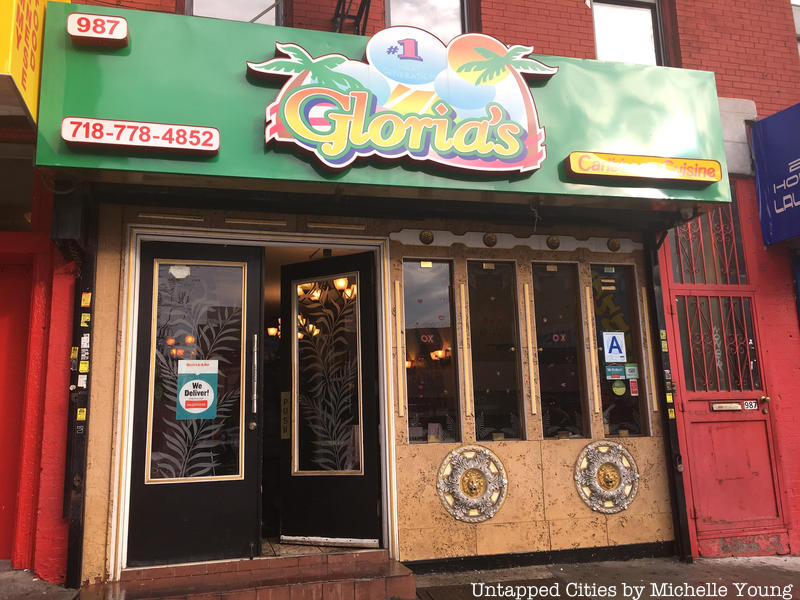
According to the spreadsheet, Brooklyn has the highest number of Black-owned businesses of all five boroughs, especially in areas like Bedford-Stuyvesant and Crown Heights. Brooklyn was home to one of the first free African American settlements in the country at Weeksville, now part of Crown Heights, named after longshoreman James Weeks. By the 1850s, the area had at least 500 residents, many from the south, and it had one of the first African-American newspapers, the Freedman’s Torchlight. Weeksville served as headquarters of the African Civilization Society, and the area served as a refuge for many African Americans during the 1863 Draft Riots. Brooklyn was a fervent supporter of the Union during the Civil War, erecting the Henry Ward Beecher monument after the war.
Areas like Bedford-Stuyvesant saw immigrants from the American South and the Caribbean around the 1930s, many working at the Brooklyn Naval Yard during World War II. Referred to as “Brooklyn’s Little Harlem,” Bedford-Stuyvesant became a cultural center if Black life in New York City. However, the area also experienced numerous race riots as a result of police brutality and racist sentiments. Gentrification hit many areas of Brooklyn, and neighborhoods like Williamsburg and Cobble Hill saw much of its Black population move away. The area of Crown Heights was also the site of the Crown Heights Riots, in which the car of prominent Hasidic rabbi Menachem Mendel Schneerson hit two Guyanese children. Today, Brownsville, East New York, and Coney Island have prominent African American communities, and Brooklyn houses at least 100 Black-owned restaurants.
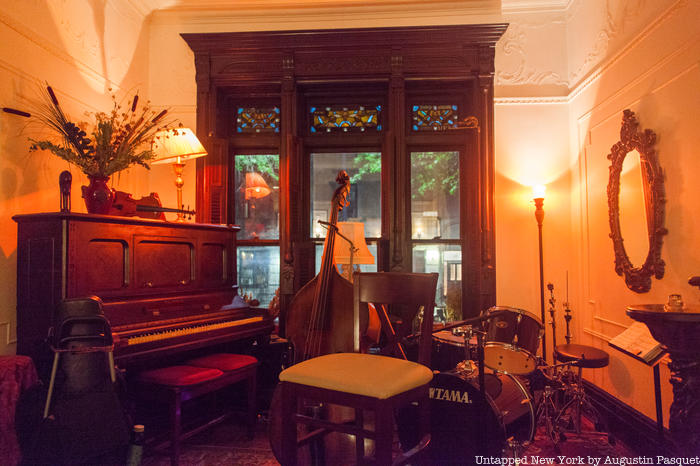 Brownstone Jazz at the Sankofa Aban Bed & Breakfast
Brownstone Jazz at the Sankofa Aban Bed & Breakfast
Bedford-Stuyvesant has at least 30 Black-owned eateries representing cuisines from Southern to Senegalese to pan-Latin. To start, A&A Bake Doubles and Roti is a small Trinidadian cafe offering its namesake roti with curry and doubles, curry chickpeas with flat bread. Restaurants like Le Paris Dakar and Joloff Restaurant offer Senegalese classics like Yassa Yapp, or grilled meat with onions. For Southern comfort food, Peaches serves up classics like fried catfish and shrimp and grits, while Bed-Stuy Fish Fry offers a mix of soul food and Louisiana fare. Black-owned bars range from the hip Basquiat’s Bottle to the more formal Rustik Tavern, while cafes include The Council Cafe, Cafe on Ralph, and Doctor’s Cave Cafe. Worth mentioning is also Brownstone Jazz, which also offers a great fish fry with live jazz jamming (and a Bed & Breakfast) and Zaca Cafe, a French-American cafe.
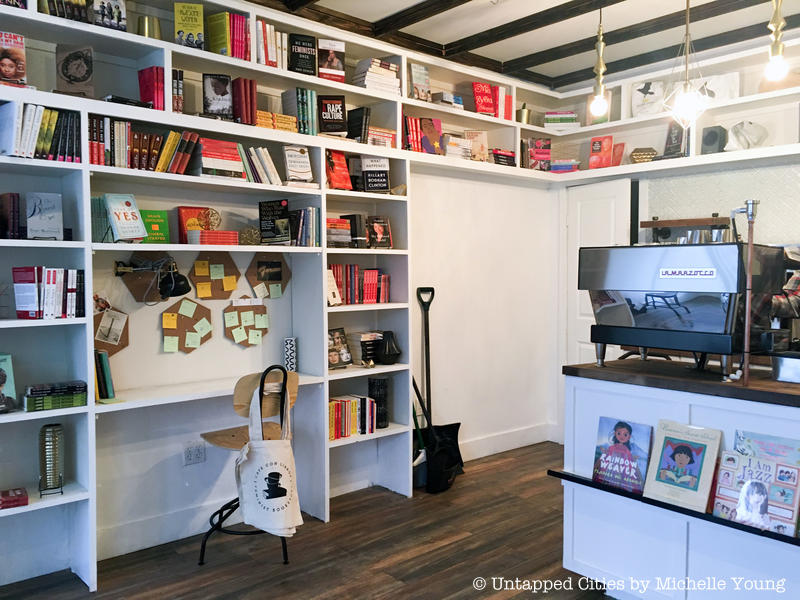 Cafe Con Libros
Cafe Con Libros
With at least 20 Black-owned restaurants, Crown Heights (where the Untapped New York office is located!) is another of Brooklyn’s epicenters of talented Black chefs. Brooklyn Suya, a Nigerian spot, has build-your-own suya bowls, made using spicy meat skewers. Gloria’s, in two locations, famous for its Caribbean fare that appeared on an episode of No Reservations with Anthony Bourdain. Cafe Rue Dix offers a selection of French-Senegalese dishes, while Ras Plant Based prepares classic Ethiopian dishes using local ingredients. Caribbean eateries include Ital Kitchen, a vegan place named for the diet of the Rastafari movement, Peppa’s Jerk Chicken, and Island Pops. For more contemporary approaches to Caribbean and Southern cooking, Lakou Cafe offers Haitian-American fusion, while Black Nile offers soul and Cajun innovations like seafood loaded fries and shrimp scampi over grits. Cafe Con Libros is a feminist bookstore and coffee shop.
Prospect Lefferts Garden is home to a number of creative Black-owned eateries like Mangoseed, serving jerk chicken and tropical cocktails. Zanmi, a modern Haitian eatery, offers dishes like chicken with sweet peas and Lobey Fritey, fried plantains with sausage, while & Sons offers over 10 varieties of ham and 15 varieties of cheese.
In Prospect Heights, Cheryl’s Global Soul offers everything from jerk chicken bowls to Tonkatsu to Moroccan vegetable tagine. Nurish and Natural Blend both offer vegan and vegetarian cafe fare, while Mitchell’s Soul Food is a no-frills Southern joint known for fried chicken and peach cobbler.
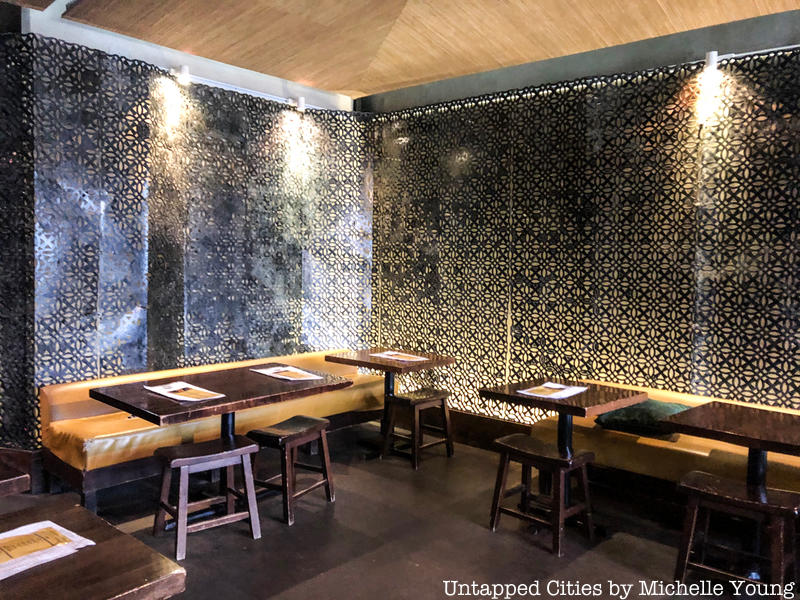 Ghenet
Ghenet
Clinton Hill also has a number of African and African-American eateries, like Buka, a hip Nigerian restaurant with popular dishes ranging from Igbin, or land snails, with fufu, bitter leaf soup, yam porridge, and Edikaikong, or goat and tripe with spinach and crayfish. Ghenet on the Park Slope/Gowanus border is an Ethiopian eatery known for dishes like doro wat over injera bread. Also popular in the neighborhood is Soco, a Southern fusion restaurant, and Mac Shack.
Queens
New York’s most ethnically diverse borough, Queens is well known for its Caribbean and West Indian cuisine, concentrated mainly around the areas of Jamaica and Rosedale. West Indians immigrated to Jamaica in the 1800s when the Union Hall Academy opened, attracting students from across the US and the West Indies. Queens didn’t see a large migration of African Americans until the 1970s, as white flight began and housing prices began to fall. West Indians, Guyanese, and Surinamese immigrants began moving to other areas like Ozone Park at the turn of the 21st century, and Richmond Hill, known as Little India-Guyana-Trinidad and Tobago, saw a rise in its immigrant population around the 1970s. Across Queens are tributes to African-American communities like the Proctor-Hopson Circle, members of the 369th Infantry of the National Guard (the Harlem Hellfighters); Gladys Warren Triangle, named for the founder of the Hollis Local Development Corporation; and Liberty Triangle, painted with the stripes of the Pan-African Flag.
In Rosedale, Henrica’s serves a very rare fusion of Chinese and Jamaican cuisine, with dishes like jerk pork lo mein and curry shrimp. Nearby is Island Taste, serving roti and Italian-influenced dishes like seafood pasta and poached salmon. Other Caribbean places in the area include Pa-Nash Eurosoul, which also offers some Mediterranean cooking, Breeze’s Island Grill, and Forever Jerk.
 Patty World in Jamaica
Patty World in Jamaica
Nearby in Jamaica is one of Queens’ only Nigerian eateries, Africana Restaurant, serving classics like Egusi soup and and Ogbono soup. The Door in Jamaica is best known for its jerk chicken with rice and beans, while Ky’s Takeout features Haitian cuisine. In nearby Ozone Park, Heat Caribbean Kitchen offers both traditional Jamaican fare as well as Jamaican twists on Chinese dishes. Also popular is Sybil’s, a Guyanese bakery opened in 1976 known for its roti, stews, and curries. In addition to the area’s many Caribbean eateries, Smoke BBQ Pit in Jamaica offers classic BBQ options like rib tips and brisket as well as Southern dishes like fried catfish. Patty World serves Caribbean favorites from beef and chicken patties to customer favorites such as oxtails and jerk chicken.
Outside of these areas are a number of Black-owned restaurants, such as Jamaica Breeze in Elmhurst with options like cow foot, beef patties, and steamed fish with okra. In nearby Astoria is Something Catchy, a seafood restaurant that also offers soul food. Barbecue is popular at Queens Bully in Forest Hills and K & A Bar in Glendale, while sandwiches and healthy options are offered at King’s Juice Bar in Ridgewood and Cafe Moca in Glendale. In Astoria, Snowdonia Pub is a farm to table and locally sourced Irish pub, with the kitchen helmed by owner Carrie Spiller and her Welsh husband.
Staten Island
Staten Island only has a few Black-owned restaurants, yet the island was home to one of the first African-American communities at Sandy Grove. Founded in 1828, Sandy Grove was formed just months after New York abolished slavery, and many of its residents were skilled in the oyster trade. According to the New York Times, 10 families who trace their ancestry back to the original settlers still live in Sandy Ground. Although the Great Migration did not influence Staten Island as much as the other boroughs, the island is home to one of the largest Liberian communities in the United States, with around 10,000 residents of Liberian descent.
Despite this large Liberian community, there are only a few Black-owned restaurants on the island, perhaps the best-known being Chez Adja African Restaurant in Tompkinsville, a Senegalese and Nigerian eatery known for fish stews and meat pies. Nearby is Mona’s Cuisine, an eatery serving West African and Caribbean fusion. By the water in Rosebank, Bayou offers New Orleans-style fare like Blackened chicken, jambalaya, and crawfish etouffee. Elm Park is home to Koten’s Carribean and American Restaurant, a casual Jamaican restaurant, and Tompkinsville is the home of Jamaican eatery Blaze Jamaican Restaurant.
Discover even more Black-owned restaurants in this compiled spreadsheet. Next, check out 10 Times Curfews Have Been Imposed on NYC.

